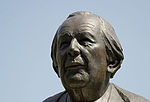In machine learning and computer vision, M-theory is a learning framework inspired by feed-forward processing in the ventral stream of visual cortex and...
26 KB (4,143 words) - 21:14, 20 August 2024
computational learning theory, probably approximately correct (PAC) learning is a framework for mathematical analysis of machine learning. It was proposed...
7 KB (907 words) - 11:26, 23 October 2024
datasets for machine-learning research – Machine learning based fault detection in Electronics Circuit M-theory (learning framework) The definition "without...
135 KB (14,748 words) - 13:28, 21 November 2024
Learning theory describes how students receive, process, and retain knowledge during learning. Cognitive, emotional, and environmental influences, as...
53 KB (6,664 words) - 22:55, 10 August 2024
Social learning theory is a theory of social behavior that proposes that new behaviors can be acquired by observing and imitating others. It states that...
49 KB (6,240 words) - 11:49, 18 November 2024
The framework draws on research into systems theory, complexity theory, network theory and learning theories. The idea of the Cynefin framework is that...
28 KB (2,973 words) - 06:24, 12 November 2024
E-learning theory describes the cognitive science principles of effective multimedia learning using electronic educational technology. In recent applications...
17 KB (2,137 words) - 08:29, 19 November 2024
Vygotsky (1896-1934), emphasized the importance of sociocultural learning in his theory of social constructivism, highlighting how interactions with adults...
56 KB (6,254 words) - 22:20, 24 October 2024
The distributional learning theory or learning of probability distribution is a framework in computational learning theory. It has been proposed from...
22 KB (3,845 words) - 17:38, 16 April 2022
education and work. Learning theory (education) Experiential learning Sims, Ronald R (1983). "Kolb's Experiential LearningTheory:A Framework for Assessing Person-Job...
6 KB (719 words) - 12:24, 27 September 2023
system Learning rule Learning with errors M-Theory (learning framework) Machine learning control Machine learning in bioinformatics Margin Markov chain geostatistics...
39 KB (3,386 words) - 20:13, 10 November 2024
Comprehensive Framework for the Number of Components of Ensemble Classifiers". arXiv:1709.02925 [cs.LG]. Tom M. Mitchell, Machine Learning, 1997, pp. 175...
52 KB (6,574 words) - 06:47, 2 November 2024
cumulative learning theory is better than the maturational model because of the focus on the hierarchies of capabilities. In this framework, instead of...
12 KB (1,477 words) - 16:06, 23 September 2024
instruction. This theory of learning involved two steps. The theory stipulates that there are several different types or levels of learning. The significance...
3 KB (360 words) - 02:23, 17 September 2024
Experience and Learning. New York: Change Magazine Press. p. 63. Hutton, M. (1980). Learning from action: a conceptual framework, in S. Warner Weil and M. McGill...
28 KB (3,525 words) - 08:38, 18 November 2024
Andragogy (redirect from Andragogical learning theory)
facilitators of learning. Although Malcolm Knowles proposed andragogy as a theory, others posit that there is no single theory of adult learning or andragogy...
28 KB (3,031 words) - 09:28, 31 May 2024
framework for learning, like all frameworks, is an organizing structure through which learners and learning can be understood. Intelligence theories and...
28 KB (3,021 words) - 17:59, 9 December 2023
Hypothesis Theory is a psychological theory of learning developed during the 1960s and 1970s. In the basic experimental framework, the subject is presented...
3 KB (461 words) - 19:29, 29 June 2018
qualifications framework is a formalized structure in which learning level descriptors and qualifications are used in order to understand learning outcomes...
20 KB (2,565 words) - 04:07, 17 October 2024
Physics-informed neural networks (category Deep learning)
given by the Extreme Theory of Functional Connections (X-TFC) framework, where a single-layer Neural Network and the extreme learning machine training algorithm...
34 KB (4,379 words) - 22:37, 21 November 2024
form of computational learning theory, which attempts to explain the learning process from a statistical point of view. VC theory covers at least four...
20 KB (3,747 words) - 12:08, 8 July 2024
Cultural-historical activity theory (CHAT) is a theoretical framework to conceptualize and analyse the relationship between cognition (what people think...
72 KB (7,698 words) - 13:01, 15 November 2024
outside media influences. This theory was advanced by Albert Bandura as an extension of his social learning theory. The theory states that when people observe...
56 KB (7,062 words) - 02:00, 5 October 2024
contributed to the M. Crossan, H. Lane and R. White (1999) 4I framework of organizational learning by identifying the barriers to the learning process. There...
79 KB (9,557 words) - 02:51, 21 April 2024
Instructional theory is different than learning theory. A learning theory describes how learning takes place, and an instructional theory prescribes how...
13 KB (1,491 words) - 18:19, 17 May 2024
Cognitivism (psychology) (redirect from Cognitivism (learning theory))
cognitive theory seeks to explain the process of knowledge acquisition and the subsequent effects on the mental structures within the mind. Learning is not...
20 KB (2,390 words) - 14:10, 8 September 2024
Transformative learning, as a theory, says that the process of "perspective transformation" has three dimensions: psychological (changes in understanding...
38 KB (4,831 words) - 16:43, 27 September 2024
in motor learning. This framework relates practice variables to the skill level of the individual, task difficulty, and information theory concepts....
9 KB (1,257 words) - 17:32, 22 May 2023
of a more general framework named random utility inverse reinforcement learning (RU-IRL). RU-IRL is based on random utility theory and Markov decision...
64 KB (7,464 words) - 21:26, 14 November 2024
further developed in relation to students learning and working by Kath M. Melia. The benefits of using grounded theory include ecological validity, the discovery...
58 KB (7,607 words) - 13:49, 18 October 2024







